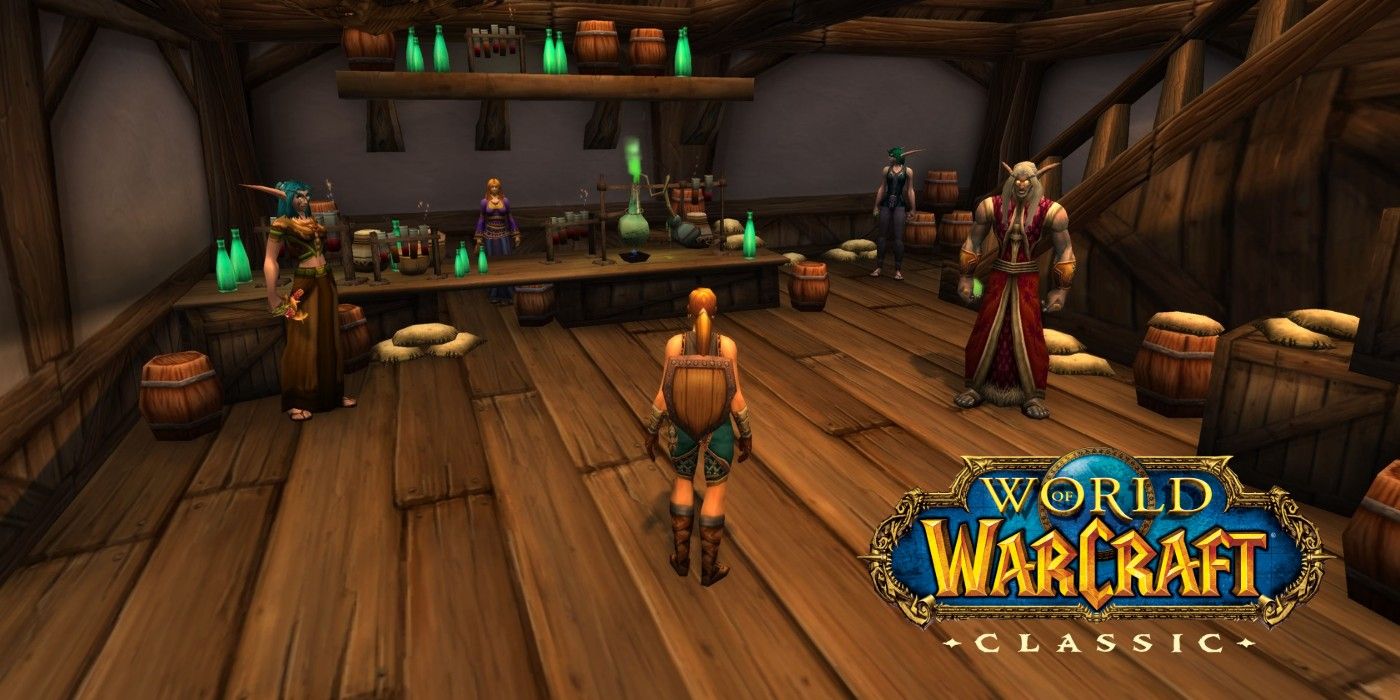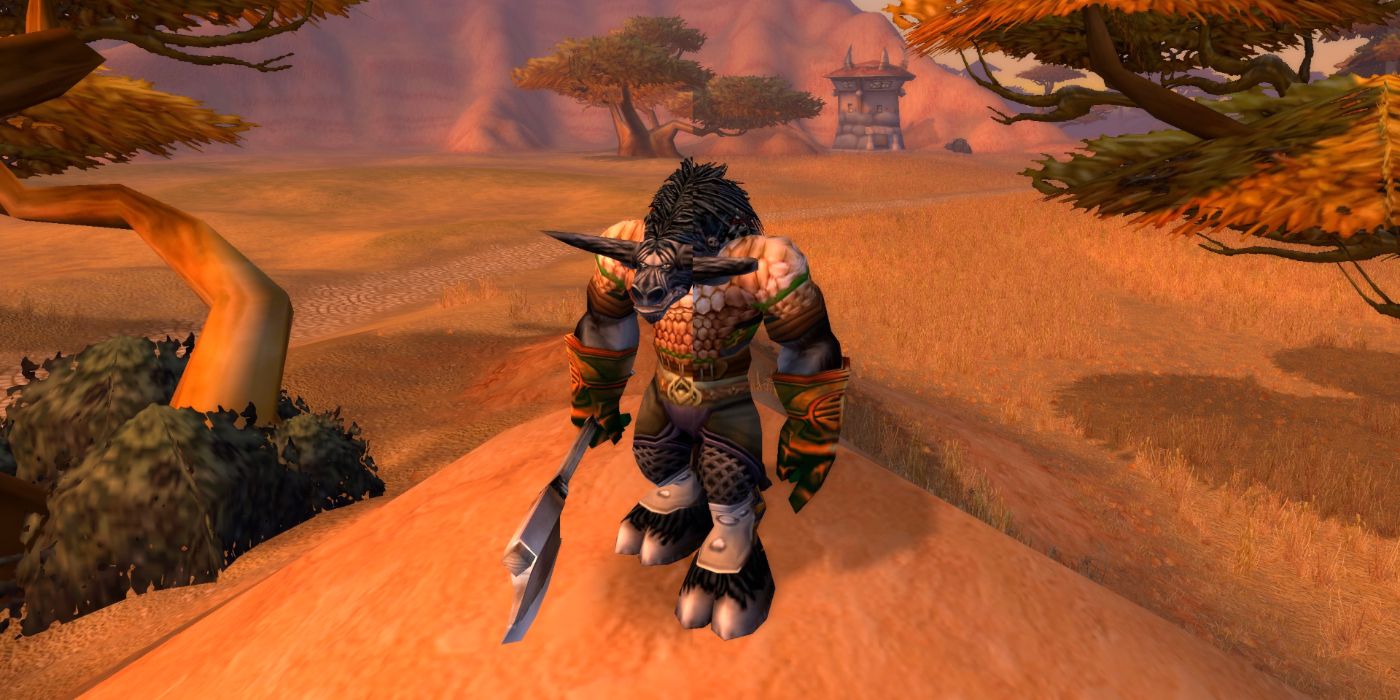WoW Classic professions are a key element in enjoying the game to its fullest. Unlike in regular WoW, which has been largely streamlined and has gradually become much more forgiving to players who don't specialize in professions, Classic WoW requires players to really integrate with all of its systems to the fullest of their ability or risk being left behind.
WoW Classic presents players with a number of choices that are much more difficult in their early iterations than in their more recent versions. For instance, the decision between which WoW Classic faction to choose doesn't just offer aesthetic dilemmas - players will be restricted on who they interact with and, more importantly, which classes they can choose to pursue. WoW Classic racial exclusives also play a much more critical role in compositions for players, with some races, like the Undead, having abilities in Will of the Forsaken that are simply better options than nearly everything else.
In short - WoW Classic is a min-maxers dream, the kind of game that rewards detailed spreadsheets mapping out gameplay plans and carefully plotted routes through zones of Azeroth to maximize efficiency. That style isn't necessarily for everyone, though, and WoW Classic professions can be an extremely lucrative and useful aspect of the game even for those without as much free time to sculpt a gameplan of their own. For those who want to save time, Screen Rant has put together a complete guide to WoW Classic professions that will explain what they are, which choices are best, and more.
WoW Classic Professions Explained
WoW Classic has several professions to choose from, but some of them are more significant than others. There are Production Professions, which allow players to craft gear that can be equipped or traded for profit, and some professions also have powerful Bind on Pickup items that are exclusive to the creator of them. Production Professions are as follows: Alchemy, Blacksmithing, Cooking, Engineering, Leatherworking, and Tailoring.
Service Professions do not generate items that are equip-able, but they allow players to instead create goods that benefit themselves and other players, often at a premium. The two Service Professions are Enchanting and First Aid.
Gathering Professions are the WoW Classic professions that players will likely spend the most time engaging in. The professions help supplement the Production Professions, as they allow players to gather the materials necessary to craft the items from them. The raw resources can also be sold to people looking to raise their Production Profession level, making them lucrative endeavors as well. The Gathering Professions are Fishing, Herbalism, Mining, and Skinning.
Players can only choose two Primary Professions, which are as follows: Alchemy, Blacksmithing, Enchanting, Engineering, Herbalism, Leatherworking, Mining, Skinning, and Tailoring. The other professions are considered to be Secondary Professions and can be learned without restriction: Cooking, Fishing, and First Aid.
Additionally, two professions have subclasses with additional recipes. Engineering offers players both Goblin and Gnomish Engineering, while Leatherworking features Dragonscale, Elemental, and Tribal subclasses.
How To Level Up WoW Classic Professions
The level up system for professions is actually relatively simple. Players need only craft or gather items until the WoW Classic profession system determines it is now too easy for them, and players will then receive or be sent to acquire new recipes that are more complex and require more dangerous zones to be explored.
Profession skilling is indicated by color:
- Orange - 100% chance to get an increase in skill
- Yellow - frequent chance to get an increase in skill
- Green - infrequent chance of getting an increase in skill
- Grey - never receives an increase in skill
Some professions have exceptions to this rule, however. Orange mobs do not always grant a Skinning increase in skill, while all fish can contribute to increases in skill even when they're not rare - for Fishing, it simply takes more catches to reach skill point plateaus when fishing easy-to-catch targets.
WoW Classic Profession Ranks
WoW Classic profession ranks are also straightforward. Players need to hit a certain skill level in their profession before returning to a profession trainer to learn the next rank. Swapping professions causes all ranks to be lost and the player to start at level 1, so it's not recommended - make sure to choose the correct profession the first time around!
- Apprentice - up to 75
- Journeyman - up to 150
- Expert - up to 225
- Artisan - up to 300
Player levels are also required to sync up with specific skill level requirements:
- Apprentice - Level 5 required for Production/Fishing Professions, no requirement for Gathering
- Journeyman - Level 10 required for Production/Fishing Professions, no requirement for Gathering
- Expert - Level 20 required for Production Professions, and Level 10 required for Gathering and Fishing Professions
- Artisan - Level 35 required for Production Professions, Level 25 required for Gathering Professions, and Level 10 required for Fishing
WoW Classic Profession Bonuses
Two races offer Profession bonuses that can make skilling up quicker. Taurens get a passive increase of 15 in Herbalism, while Gnomes get a passive increase of 15 in Engineering.
WoW Classic Primary Professions Breakdown
- Alchemy - Alchemy is a popular choice for PvE players since it provides a lot of strong consumables for raid content. It relies on materials from Herbalism and Fishing for most of its recipes.
- Blacksmithing - Blacksmithing is usually the choice for plate-wearers since it produces heavy armor and strong weapons in Sword and Axe specializations (as well as many others). Blacksmiths need to use a Blacksmith Hammer to craft their wares and all crafting must be done at an Anvil. Blacksmithing uses materials from Mining, mostly.
- Enchanting - Enchanting allows players to enhance gear slots permanently, as well as disenchant gear into dust that is then used to help fuel Enchanting. Enchanters mostly use high-quality gear as resources for the profession, but it's also paired well with Tailoring since many casters choose to use Enchanting as their Primary.
- Engineering - Engineering is the wackiest profession, not really occupying a specifically great spot but being a great Hunter profession for DPS. It's also the best PvP profession thanks to its gadgets. Engineers need Mining materials quite often, but Engineering recipes borrow from most professions at regular intervals, so Engineers should expect to spend more on materials than many other Primary Professions might otherwise.
- Herbalism - Herbalism is popular because it's profitable. Herbs are required by Alchemy users for raiding, making them highly in-demand.
- Leatherworking - Leatherworking is often paired with Skinning and is used to make Leather and Mail gear. Leatherworking provides decent resistance stats in PvE situations and are useful to Hunters because they can make ammo pouches that improve Ranged Attack Speed.
- Mining - Mining is once again a very profitable profession thanks to its reliance on gathering raw materials that are used across many other professions. Miners need to carry a Mining Pick and must smelt the ore they get at anvils to turn it into bars that can be used in recipes. Sometimes miners come across gems and stones used in other crafting recipes.
- Skinning - Skinning is another gathering profession but it's by far the least lucrative in the early going. Later Leatherworking builds rely heavily on it and many of the materials can be quite rare, though, so it balances out towards the end.
- Tailoring - Often chosen by casters, Tailoring makes light Cloth gear. Some Tailoring gear provides unique bonuses found nowhere else, but the primary reason to take this profession is the incredible amount of money it can generate. Tailors make bags, which can increase the amount of inventory space a player has. Higher level bags are in extreme demand from players without access to Tailoring.
WoW Classic Secondary Professions
The WoW Classic secondary professions are also enjoyable pursuits for those with the time, but ultimately First Aid should be a priority since it allows self-heals in and out of combat. That's especially important for classes without self-sustain otherwise, chiefly Rogues and Warriors.
- Cooking - Cooking provides players with food that helps restore health and mana quickly, and can also give raiders Well Fed stat bonuses ahead of boss content. Cooking Fires are required to begin cooking.
- First Aid - Allows anyone to bandage, healing themselves or other players inside and outside of combat. This is an extremely useful skill and has good applications in PvP as well. First Aid has several different anti-venom recipes as well although, as a caveat, the ones from Alchemy are generally so much stronger the First Aid variants aren't very sought after.
- Fishing - Fishing is a huge time-sink, but allows players access to the ingredients to several exclusive recipes and some ingredients to important recipes in other professions.
The Best WoW Classic Profession Pairings
While there are plenty of viable options for most WoW Classic profession pairings, we'll provide a quick recommendation for each one that is meant to serve more as a baseline for those who don't want to look too hard into it rather than a hard rule for min-max-oriented players.
Alchemy
Alchemy pairs well with both Herbalism and Fishing. It's relatively straightforward, then, to simply pick up Alchemy and Herbalism as Primary Professions and to try to level Fishing in conjunction with those two. Keep in mind that at higher levels alchemists also need access to Mining ore, so a long-term investment in Mining instead of Herbalism is feasible although not highly recommended by any stretch, given the pressure it exerts on finances early on in leveling the profession.
Blacksmithing
Blacksmithing wants Mining. Nothing more, nothing less. Blacksmithing is ore-hungry and barely needs anything else.
Cooking
Cooking is obviously a secondary profession and thus doesn't really need to be planned out too well, given that it's free to take with no restrictions. With that said, though, if players are leveling Fishing, Cooking is a natural pairing with it that provides fuel for recipes and thus more access to food and drinks later.
Enchanting
Enchanting pairs well with a number of different professions, but it should be one that provides gear. That's because making gear and then disenchanting it for dust is one of the quickest ways to generate materials while attempting to level the profession. Tailoring is the best choice for Enchanting, though - materials for Tailoring are typically looted from humanoid enemies, rather than as a product of a Gathering Profession, making it much cheaper to learn and level. Tailoring is also a financial juggernaut thanks to bag crafting, as an added bonus.
Engineering
Mining again. Engineering wants ore more than it wants anything else.
Fishing
See "Alchemy" above for the ideal pairing.
Leatherworking
Leatherworking needs Skinning, since the reagents the latter gathers are almost exclusively used for the former. Sometimes the most obvious decision is the best one.
Mining
See "Blacksmithing" and "Engineering" above.
Skinning
See "Leatherworking" above.
Tailoring
Tailoring might be a natural fit for Enchanting, but there is another option for players who would prefer having a Gathering Profession. Skinning reagents are sometimes required for Tailoring recipes, and provide a Gathering Profession that can also provide money during leveling.






